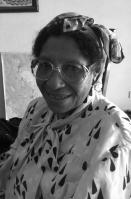Matilda Pilacapio

Matilda Pilacapio has been a human rights advocate and environmental campaigner for over 30 years. In this interview she recalls her time working at the Burns Philp company on Samarai Island and reflects on the growing momentum of the independence movement.
| Time | Summary | Keywords |
|---|---|---|
| 00:01:01 |
Matilda Pilacapio is welcomed to the interview and describes her first contact with Europeans and her upbringing on a coconut plantation. She states that she is the daughter of a mixed race planter, and her father had both a liquor and a gun licence. She states that she mixed with her father's colonial friends including Kiaps. She states that she went to an Anglican Mission School as a boarder. |
education, Filippino |
| 00:05:23 |
Matilda Pilacapio recalls that it was at school that she first heard about independence. She recalls that at school she had pictorial education magazines from which she learnt about Africa. She states that her father was very political and listended regularly to radio and read newspapers and the Papuan Villager magazine. |
Africa, Indonesia, John Guise, magazines, newspapers, radio |
| 00:09:28 |
Matilda Pilacapio describes working on Samarai Island in 1964 as an assistant ledger machinist for Burns Philp and the racial segregation of work in the office. She states that she was trained to use the ledger machine. |
Burns Philp, Milne Bay, Samarai Island |
| 00:13:02 |
Matilda Pilacapio states that she learnt about independence while working for Burns Philp. She recalls the Milne Bay politician Alice Wedega who was in the national government. She recalls that she hoped that the white people would not leave at independence, and that there would not be bloodshed as in Africa. |
Africa, Alice Wedega, Burns Philp, independence |
| 00:15:52 |
Matilda Pilacapio describes how Burns Philp gave her a house on Samarai Island in 1964 as her wedding present, an unusual thing. She recalls having the day off for her wedding and going cycling and diving. She relates that she named her daughter born on 11 August 1969 Fraulein Silvia, after a German woman Fraulein and after Salitia Pipit a fast runner and competitor in the South Pacific Games. |
Burns Philp, marriage, Salitia Pipit, South Pacific Games |
| 00:19:19 |
Matilda Pilacapio discusses how she was treated by the whites in PNG, saying she mixed well. She recalls joining the Girl Guides Movement and then took her uniform back and joined the Boy Scouts instead and became a cub master. She states that Samarai was a small island and everyone played soccer or cricket and mixed together. |
Boy Scouts, Girl Guides, Samarai Island, sport |
| 00:21:23 |
Matilda Pilacapio discusses the church backgrounds of Papuan leaders and the importance of her own Anglican background. |
Alice Wedega, John Guise, Kwato Church |
| 00:22:47 |
Matilda Pilacapio states that she drew a bigger wage at Burns Philp than her husband who was a medical midwife. She reflects on the flexibility of gender roles in Milne Bay, and the importance of the matrilineal society in men respecting women. |
Burns Philp, matrilineal society, Milne Bay, status of women, wages |
| 00:25:08 |
Matilda Pilacapio recalls that although she was earning more than her husband she was not earning as much as white women at Burns Philp. |
Burns Philp, wages |
| 00:28:21 |
Matilda Pilacapio recalls that during the 1968 election she voted for John Guise. She describes his leadership style as humble, eating brown rice and bully beef during his campaigning and travelling on the copra boats. She recalls that he would wear a t-shirt and brown khaki half-tone shorts and campaign on the beach. She states that in the house of assembly he would challenge anybody and recalls him taking on Bishop David Hand. She recalled that that Bishop Hand also wore khaki clothes, trying to look more like a patrol officer than a bishop. |
1968 election, David Hand, John Guise, leadership, political campaign |
| 00:31:42 |
Matilda Pilacapio discusses the presumption that Michael Somare would be prime minister in 1972, saying she rallied behind John Guise. She recalls that John Guise was probably the only one who could be governor general. She describes the balance of Papuans in the leadership positions. |
Albert Maori Kiki, Barry Holloway, John Guise, Michael Somare |
| 00:34:15 |
Matilda Pilacapio states that she was disappointed the country did not have 10 years transition from self government to independence, training public servants and others. She describes the fear of bloodshed prior to independence and her father noticing that whites and mixed race people were leaving the country. |
independence, Matthias Toliman, Tei Abal |
| 00:39:37 |
Matilda Pilacapio discusses the church's position on independence. |
Dawa Solomon, university graduates |
| 00:41:17 |
Matilda Pilacapio discusses the transition of the capital of Milne Bay from Samarai Island to Alotau in 1964. |
Alotau, Burns Philp, Milne Bay, Samarai Island |
| 00:43:40 |
Matilda Pilacapio relates how after her daughter was born in 1969 she left Samarai Island and went back to the plantation on the mainland as her husband was away often, before moving to Woodlark Island. She reaclls the sadness around losing her father in 1970. |
Samarai Island, Woodlark Island |
| 00:47:55 |
Matilda Pilacapio describes her first time in Port Moresby to deal with legal issues surrounding her late father's plantation and her involvement with complex legal system of Australia and PNG in her divorce. She recalls that she had the same lawyer as Talair owner Dennis Buchanan, leading later to his support for her 1977 election campaign. |
1977 elections, Dennis Buchanan, legal system, Talair |
| 00:53:14 |
Matilda Pilacapio gives her impression of Port Moresby in 1971, saying she was shocked by the number of houses and thought perhaps the houses would be taken away when the white people left or that they would be given to black people at independence. She relates that she had access in Port Moresby to several exclusively white clubs. |
Port Moresby |
| 00:56:00 |
Matilda Pilacapio discusses Papua Besana and Josephine Abaijah and some ambivalence about supporting her, and the rise of many factions which some thought would split the country apart at independence and lead to bloodshed. |
bloodshed, Josephine Abaijah, Papua Besena movement |
| 00:59:36 |
Matilda Pilacapio states that she heard about factions by listening to radio and reading newspapers and the South Pacific Post. She describes Nahau Rooney travelling out to try and bring the factions together. |
Nahau Rooney, newspapers, radio, South Pacific Post |
| 01:03:03 |
Matilda Pilacapio describes working in 1974 at PNG Motors in Port Moresby during the day and at a restaurant at night. She recalls leaving in 1975 to work for PNG Printing where Ray Thurecht was chair of the Papua New Guinea Independence Air Race. |
Papua New Guinea Independence Air Race, Ray Thurecht |
| 01:06:05 |
Matilda Pilacapio describes travelling on independence eve back to Samarai Island with a bottle of whisky to celebrate 'Happy Underpants' Day. |
independence, Samarai Island |
| 01:11:43 |
Interview concludes. |
Biography

Matilda Pilacapio
MATILDA MAY PILACAPIO – A WOMAN OF COURAGE AND A GREAT ADVOCATOR
Since 1975, there have been some unique women who have immensely contributed to Papua New Guinea's development. One such woman of great courage and a strong public policy issues advocator is Ms Matilda May Pilacapio of Milne Bay Province ̶ who is a real fighter without fear or favour. Matilda takes every opportunity to advocate many things most people take for granted.
Matilda is an avid “Advocator" for many important issues that governments just won't address in any consistent way to achieve satisfactory outcomes. In other words, she wants the government to do the right thing by the people.
In four decades she is still fervently fighting for a better world in many different ways including strongly advocating against human rights abuses, environment protection, and of bad government decisions that will hurt local resources owners.
Matilda is a true inspiration to many Papua New Guineans, and in her never give up fighting spirit will always argue strongly in public forums and mass media by taking to task state agencies on many important national issues that needs to be critically addressed in the national interest.
Matilda Pilacapio has been a human rights advocate for over 30 years. Originally from Milne Bay, she was elected the first female provincial member of assembly for the southern region of PNG. Matilda is a tireless grassroots environmental organizer. She worked with the organization Milne Bay Women in Agriculture to strengthen traditional agricultural systems in response to expanding oil palm plantations in her region. She continues to be the voice for many other causes and has led a number of education, environment, and women’s groups, including the Milne Bay AIDS Council and the Alotau Women’s Association.
In 2012 Matilda was PNG’s nomination for the U.S. Secretary of State’s International Women of Courage award.
MATILDA MAY PILACAPIO
31st August 2015, Port Moresby
[from http://portmoresby.usembassy.gov/mr_042213b.html]:
Copyright © Papua New Guinea National Museum & Art Gallery, 2025
The copyright holder of this material grants users permission to access the material on this website for the following purposes only: research and study, education, other non-commercial and non-public uses.




